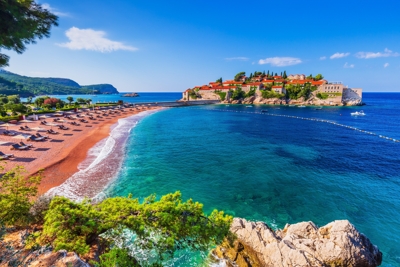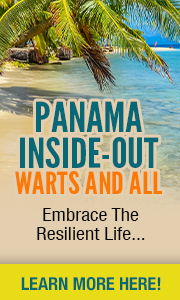---------- Forwarded message ---------
From: Kathleen Peddicord <editorial@liveandinvestoverseas.com>
Date: Fri, Sep 3, 2021 at 11:41 AM
Subject: One More Delightful Surprise In Europe--No, They Will Not Tax You To Death
To: <stevescott@techacq.com>
From: Kathleen Peddicord <editorial@liveandinvestoverseas.com>
Date: Fri, Sep 3, 2021 at 11:41 AM
Subject: One More Delightful Surprise In Europe--No, They Will Not Tax You To Death
To: <stevescott@techacq.com>
You May Be Surprised At How Low Taxes In Europe Can Be | Too Many Emails?
| One More Delightful Surprise In Europe—No, They Will Not Tax You To Death Sept. 3, 2021 Paris, France  PLUS:
Dear Overseas Opportunity Letter Reader, People often take Europe off the list of possibilities for where to move or invest overseas because they assume the residency options are too limited or expensive... and the tax implications too onerous. The truth is that residency can be easier to obtain in some European countries than it is in some Latin American countries. I'd qualify Portugal and Cyprus as among the easiest and without question the most affordable countries in the world to become a resident. In each case, you can qualify simply by showing a minimum monthly income. In the case of Cyprus, the minimum amount required is but 9,570 euros per year. That works out to 797.50 euros per month. At the current exchange rate, that's about US$905... which is about US$600 less per month than the average Social Security check. That is to say, a concern that residency will be too difficult or too expensive to qualify for should not be the reason you don't retire to Europe if Europe is where you'd like to retire. Neither should the tax burden of living or investing in Europe keep you away... because the tax liabilities you might incur in that part of the world are not necessarily more burdensome than they are in the United States. Sometimes they can be less burdensome. It all depends on where, specifically, you want to live and how your income is derived. Portugal, our number-one overall choice for where to live or retire overseas for the past four years running, is also the number-one destination in Europe for both ease of residency and minimization of taxes. As a nonresident, you can spend up to 90 days in any rolling 180-day period in any country in the Schengen zone, including Portugal. That could be 90 days straight in a Schengen country followed by 90 days outside the Schengen zone... or you could spend 30 days in and 30 days out on an ongoing basis. If you'd like to be able to stick around in Portugal indefinitely, all you have to do is to show income of at least 1,200 euros per month. That's more than is required for becoming a resident of Cyprus but still a very reasonable amount. Following this residency path, you'll be required to spend at least 183 days in Portugal. Then, thanks to your residency status in Portugal, you'd be able to spend the rest of the year in any Schengen country(ies) of your choosing. As a legal resident of one EU country, you can spend as much as 90 days at a time in any other EU/Schengen country. As a resident of Portugal, what would your tax obligations look like? Portugal currently offers what it calls a Non-Habitual Resident Tax Regime. The poorly named tax law allows new residents who haven't been tax resident in the country for the last 5 years to apply for a 10-year tax break. Bottom line, this means that the bulk of your income during those 10 years will be taxed at a reduced rate in Portugal. In addition, Portugal offers a Golden Visa program whereby you can obtain residency by making an investment in real estate. Going this route, you'd be required to spend but a week a year on average in the country (rather than the 183 days per year required under the proof-of-income option). The invest-for-residency option suits someone looking for a path to EU citizenship but not wanting or able to spend the majority of his time actually living in an EU country. Regardless which path you pursue to establish residency in Portugal, you can apply for citizenship after 5 years of legal residency... and after 10 years of illegal residency. Yes, you read that right. Portugal allows you to apply for citizenship if you can show you've been residing in the country illegally for 10 years or more. I love Portugal. Portugal isn't the only European country where you can gain residency simply by showing you can support yourself. France, Spain, Italy, and Ireland all also offer residency options based simply on how much income you can prove. Ireland's program is the most onerous. The minimum-income requirement to qualify is 50,000 euros per year per person. The biggest possible monthly U.S. Social Security check adds up to less than 30,000 euros a year... meaning no American with only Social Security income to show for himself is going to pass the test. Ireland put these minimum-income requirements in place several years ago, and no one I've spoken with in the country really understands why. You don't need 50,000 euros per year to live comfortably in Ireland. Also note that the residency permit you are issued under Ireland's income program doesn't come with a path to Irish citizenship. Ireland doesn't seem to want more foreign residents or dual nationals. Many European countries have no set income requirements. The amount you'll be required to show to establish residency will depend on the immigration officer you're assigned and the region of the country where you submit your application. This is one reason I recommend using an immigration attorney to help you with the process. A good immigration attorney can help guide you through these subtleties. The administrative process associated with a residency application differs country to country. In most cases for Europe, you must begin the process at the nearest consulate before traveling to the country; in others, you apply after you've arrived. What about your tax burden as an American in Europe? We've addressed the situation in Portugal. In general, a retired American shouldn't owe any more in taxes on his pension and/or Social Security income than he would were he living in the States. Every EU country except Croatia has signed a tax treaty with the United States. These determine which country gets to tax pension and Social Security income. Typically, the United States gets to tax the Social Security income of an American overseas and the country of residence gets to tax that American's other pension income. This is not always the case, though, so check with a tax professional to confirm the treaty specifics for the country where you want to live. All that said, as I said, bottom line, if your only income is retirement income, you shouldn't pay more in taxes as an American retired overseas than you would as a retired American living in the States. If you have a portfolio that kicks off rental income, dividends, or interest income, you'll want to dig a little deeper into the details of the relevant tax code. However, again, in most cases, you'll likely find that you'll not be taxed more by living in a European country. You may be taxed less depending on the country and its tax rates and bands. The biggest tax hit in Europe can come from social charges. Social charges associated with earned income are paid mostly by the employer. However, in some places, social charges are also imposed on passive income... another reason to take professional tax advice before making a move. You've probably also heard about wealth taxes. France's wealth tax is notorious. Historically, if you were a resident of France, the country's wealth tax applied to your worldwide assets, including jewelry (difficult to track and to value). If you hit the threshold (1.3 million euros, US$1.5 million), the tax started at a fraction of a percent. In 2018, France changed its wealth tax law. Now only real estate is included when calculating the value of your assets to determine whether or when the wealth tax applies. The threshold of 1.3 million euros remains. If you're a real estate tycoon wanting to live in France, you should speak with a French tax advisor before establishing residency to understand what you could do to mitigate any potential wealth tax hit. France gets a bad tax rap, but, in fact, Italy and Spain are probably more painful tax regimes... because of how each country calculates the amount of tax owed. The tax bands are similar among all three, but France divides household income by the number of units living in the household before applying the tax bands. Spain imposes a wealth tax that varies by region. Italy charges a wealth tax on financial assets held outside the country. However, Italy has introduced a tax incentive plan similar to Portugal for certain regions of Italy. Move to Abruzzo, for example, and you can avail of a 7% flat tax and not be liable for the wealth tax. Also, when comparing what you'd owe as an American living in the States versus what you'd owe as an American living overseas, don't forget state taxes. When it comes to taxes, everyone's situation is different. My overriding point is that you should not give up on your dream of a new life in Europe because you fear you'll owe more in taxes as a resident in that part of the world than you would if you just stayed home. I'd be surprised if that's the reality. Lief Simon Editor, Offshore Living Letter P.S. Next month, Kathleen and I will co-host this year's Live and Invest in Europe Virtual Conference. With the help of dozens of our top contacts on the ground in Europe's most appealing places to think about spending time and money—including Portugal, France, Italy, Spain, Malta, Cyprus, Montenegro, Croatia, and Ireland—we'll look at all aspects of creating a new life or diversifying your investment portfolio in this part of the world—including the particulars of establishing residency and figuring your tax burden country by country. As I've explained above, don't let a worry over your potential tax liabilities be the reason you take Europe off your shopping list. We'll show you how to manage and mitigate your euro-land tax burden when we convene for this special program next month. This is your chance to hear from and interact with experts and expats on the ground in Europe's most appealing, most welcoming, and most affordable places to call home. The first 100 who register save US$200. These places are filling very quickly. Grab yours here now before it's too late.
"Kathleen, what did you do with the house you own in Croatia? Did you rent it out? If so, were the yields good because if it was not lived in for 16 years? I didn't understand your recent comment. If you left it empty for that long, the vermin would take over. Cheers." --Roy A., New Zealand We bought our tumbledown stone farmhouse in Istria 16 years ago... and then ignored it. No, we didn't rent it... because it's not rentable. It's not habitable. We're this month, finally, undertaking the renovation in earnest with the help of the team we've put in place on the ground there. And we're happy to be able to report that, no, the vermin did not take over... just the brambles! "Kathleen, Portugal is on my mind. What is the income amount required for residence? I have seen per-person amounts. What is it for a couple? Is it times two? Thanks." --Alice K., in the Overseas Living Unlimited Clubhouse No, the minimum income requirement for a couple to qualify for self-sufficiency residency (as it's referred to) in Portugal is not two times the amount required of a single. The country doesn't stipulate a specific amount, and immigration officials have some leeway in what can be approved. Generally, our contacts say you should figure one-and-a-half times the single amount (which is 1,200 euros per month). "Kathleen, I would like to know what countries require the least money to be able to get permanent residency? I can provide documentation as a retired couple. We have an income of C$5,500 per month. "Looking forward to hearing from you. "Thank you and have a great day!" --Alejandro F., Canada With C$5,500 of income per month, you can qualify for residency nearly anywhere in the world... definitely anywhere on our top retirement havens list... including all of our options in Europe. 
| ||||||||
| Thanks for reading Overseas Opportunity Letter, a free daily email service brought to you six days a week by Live and Invest Overseas publications. To learn more or to subscribe, see: https://www.liveandinvestoverseas.com
| |||||||
| You are currently subscribed to Live And Invest Overseas as: stevescott@techacq.com through the mailing list: "live-and-invest" | |||||||
| Please add (white-list) editorial@liveandinvestoverseas.com to your e-mail address book to ensure delivery. | |||||||
| Forward to a Friend | | | Subscribe | | | Too Many Emails? | | | Unsubscribe | |







No comments:
Post a Comment